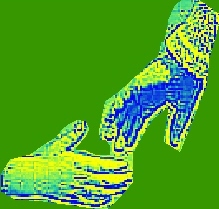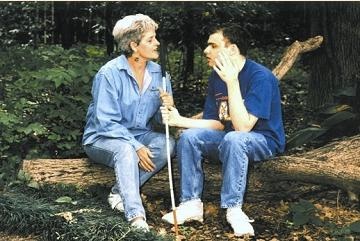
|
|
|
|
"Voices 2"
Below are more articles written by our readers. Thank you so much for contributing to Bt Digest
Submit your article to be placed
here!
Hello Bt Digest readers.
A very happy email came
across my desk today. "BLIND COUPLE OVERCOME OBSTACLES, WILL MARRY IN MAY"
Wally and Christy feel they have a
lot to be thankful for. Though both are legally blind and physically
disabled, they’re excited to celebrate their upcoming nuptials.
*******************
Sean Ashley
My
grandson Sean--who is autistic and blind--and I were returning
from the holidays on our way back to Texas School for the Blind
and Visually Impaired in Austin, Texas, one bright sunny
morning. Having already discovered there was a lack of services
I wanted for Sean, I thought, "What am I going to do?"
We, the parents, cannot depend
on other people to do it. The Sean Ashley House was incorporated in 1994 and licensed with Texas Mental Health Mental Retardation as a Texas not-for-profit (501c3) organization designed to provide "model" homes for individuals with autism, blindness, mental retardation, and/or multiple disabilities. Visit the Sean Ashley House here "CREATING M.C.S. AWARENESS ONE DANCE STEP AT A TIME" I have a disability called Multiple Chemical Sensitivity. Recently I participated in a World Wide Dance Video project where people from across the globe were asked to dance a dance written by Ira Weisburd called Shuffle Boogie Soul. It is the current number one dance in the world, danced to the song Honky Tonk by Preston Shannon. The goal is to make one large dance video. They featured my story next to the KY video and received such a large response from around the globe as to how I sat out of dance for 15 years because of reactions to chemical and scented products, that they started the Breathe Freely Campaign to create an awareness about MCS. One instructor in California e-mailed my story to his entire class as one of his students also has MCS. Another lady e-mailed me to tell me about the instructor, and said she couldn't dance because of it as well. The word began to get out and people with MCS started to "come out of the closets" so to speak. It's about time MCS received this type of coverage as we are the forgotten disability...the one no one wants to talk about. That fact in itself has caused immeasurable emotional and sometimes even physical pain amoung those with this disability due to lack of accommodations. To view the Breathe Freely Campaign they started for us, go to--- http://www.hannaian.com/sbsvideos/breathefreely.html My story is a few down below the MCS information and attached to the left of the Kentucky video. This year as a result of the Breathe Freely Campaign, the group that filmed our KY video had unscented candles at our Christmas Party to help limit my chemical exposures. I was grateful as I am unable to attend most parties and gatherings because of exposures to products others use. MCS is a very isolating disability. While I can not partake often in dance, these accommodations certainly allow me to occasionally enjoy life once again. Dance has always been my life's passion, and MCS awareness is a close second. For more information about MCS and chemical injury contact Chemical Injury Information Network at chemicalinjury@ciin.org. This is a wonderful disability campaign that is being spread across the world. - Melva Smith (The Chemically Sensitive Cowgirl from KY) January 2011
**************************************** ( Below is an edited article written by an accomplished author Stacey Chillemi) My Determination to Succeed The truths and triumphs of living with epilepsy “Since childhood, I have dreamed of having a normal life. I was determined to make sure that my disorder would not interfere with my goals and dreams. When I was young, others told me that there was a possibility that I might not be able to achieve everything I set out to do because I had epilepsy. Despite what others said, I knew deep down inside that, I could become the person I dreamed of becoming. …………I developed epilepsy at the age of five. I had contracted a sore throat and an ear infection. My mother had brought me to the doctor's office that evening and the pediatrician had put me on penicillin and told my mother to have me rest in bed. … …. My mother recalls that on the tenth night when she put me to bed, my lips were more red than usual. The next morning about 8:00 A.M., my mother woke up because she heard unusual noises coming from my room that sounded like I was choking on my saliva. She found me in my bed turning blue and having a convulsion. This was the first time I ever had a seizure…….............We also know this type of seizure as generalized tonic clonic seizure……… I was in an induced coma for four days after the grand mal seizure. The doctor had told my parents while I was in a coma that if I were to come out alive I would probably have severe brain damage and there was a good chance that I was going to become paraplegic…… This horrible news devastated my parents, but they never gave up hope. On the fourth day while I was in a coma, my father lay by my bedside and began praying to a saint. My parents told me years later that after my dad finished praying a teardrop rolled off from my eye and down my face and I woke up. ……….Phenobarbital controlled my seizures, until the age of nine. Before I was nine, the only time I would experience a seizure was when I had a high fever. …..At nine, my body began to go through the stages of womanhood. ……Once my hormones started changing, I began developing more seizures. My seizures would occur around the time of menstruation and ovulation. My neurologist told me that I was retaining water on my brain during this time of the month…… I always kept a positive outlook, hoping that I would find the miracle drug to control my seizures. At the age of eighteen, my seizures were well under control and my neurologist gave me permission to drive a car feeling that my safety was no longer in jeopardy or that could endanger someone's life while driving. I was so excited….Unfortunately, after a few years, I had to stop driving because my seizures began to increase to two or three a month. ……. .I didn’t drive for over 15 years. I felt imprisoned inside my own home relying on my friends and loved ones to take me where I needed to go. For an independent person like me this was very hard for me to endure, but I refused to let my disorder control me. ……… I felt uncomfortable sometimes-asking people for car rides because I know everyone has their own lives to live and responsibilities that they need to attend too. I didn’t want others to feel obligated to take me places when I have to go somewhere but I became better when it came to reaching out to others for help, though I have always been a self-reliant person. When someone has epilepsy or any disability, one needs to realize that you cannot do everything by yourself. In order for us to do everything we want too, we need to realize that we have to reach out for other people's support and love. Having other people's love and support is a necessity in life. No one can make it through this life alone. My family and friends have helped make my life a lot less stressful. Dealing with epilepsy for once had become easier deal with when I accepted myself and loved myself. No one is perfect, we all have our flaws ……….. Sometimes, having epilepsy has made me feel like an outcast. I have realized in the past couple years that you can do anything they want in life, if you try hard enough and put your mind to it. You need to understand that you can become your worst enemy if you let yourself. YOU CANNOT GIVE UP. You cannot fail if you try. Failure is when you give up on yourself. It has been tough for me with all the testing and medical let downs, but I focus on the positive and avoid the negative. I have grown as a person from all these experiences both mentally and spiritually. Mentally, having epilepsy has helped me mature and accept myself for whom I am. Accepting yourself is one of the most important steps to healing. You need to understand that yes, I have a disability and nothing going to change in that respect. But I have special qualities and characteristics that I can share with the world to help others like myself. The greatest gift is the gift of giving. Spiritually I have learned a lot about myself; I learned what my wants and needs. I have found myself, the real Stacey. I have also learned that one cannot let having epilepsy control my life. Yes, I have epilepsy, but I do not have to stop living. Life goes on! Be proud to be you. I am determined to live a normal life. You cannot compare your life to someone else's life. If you do, you're going to be unhappy. You need to love yourself and be satisfied with your life. If you're not satisfied than change the things in your life that make you unhappy! …… In short, there is very little in life that having epilepsy should prevent you from making your dreams a reality…………” Author Stacey Chillemi http://www.authorsden.com/staceydchillemi All rights reserved by author with permission for BtDigest to publish an edited copy of my article written above. ***
Disability in small town America can be
quite a challenge." " I will never forget, one day she came home and said - - "Mom I got kicked out of class today" - -and when I asked her why she explained that she was just feeling really good about herself that day and was being silly and popped off in class and said "I feel like Carmen Electra today!" IF you don't know who she is, she is a very busty swim suit model, (not sure what else she does) but every one thought she was freaking out and sent her out of class for being inappropriate. Of all the things other kids say this was really focused on because the teacher happened to know Rachel has Bi-Polar and she was being silly and saying something that seemed out of context. Really she just felt great that day and wanted to be silly and let the world know! How twisted it can all become, when you are a little different to begin with. Most kids would have gotten a good laugh from the other students a frown from the teacher and that would have been it. Rachel was kicked out of class and severely reprimanded for not being "socially appropriate". Go Figure!Left out, less of a person, no where to fit in, most of the clubs etc. for persons with disabilities in this area really focus on those who have intellectual disabilities and less on those with physical difficulties. Disability in small town America can be quite a challenge. How that has affected her struggle with her Bi-Polar disorder and controlling the depression, dealing with the feelings of hopelessness and loss that she feels are a pretty graphic and moving story.
She was very excited yesterday though as she went to her first day of work development training at goodwill industries. They are
looking at her clerical and reception skills to help her build an idea of where she wants to be working in the next few months or so. So she finally feels as if she is moving on with life, at least a bit at a time" |
“People who touch our heart” Friends come and go but the most memorable ones touches one's heart and minds leaving their mark on a soul forever. Nine years ago I went on this incredible journey not knowing where I would end up, or who to trust. I have been hurt so many times by my own family that I just wanted to give up. However I made some good friends along the way, friends that chose to stay and help me through thick and thin. Then there are those acquaintances in one's life belief and short lived altering the course of our existences. Some old friends visit my mind from time to time like angels remind me of all that I'm grateful for. Patty Cooks is one of those angels. She's a blind, African-American with a quick temper. She has been on my mind for several weeks now that neither time nor distance can take away my feelings towards her. I hear her voice, laughter ringing in my ear, and her pretend crying. I met and became her roommate in my first adult foster care home. "Take me out to the ball game" Patty would sing, then followed by a "Yuck" and sometimes a giggle. She was a little bit strange at first but in the weeks and ten short months to follow I grew to love Patty as a sister giving her a piece of my heart without knowing it as she become another heart sister. It wasn't too long after I moved in that Patty started acting out. I was afraid of Patty and being kicked out of foster care. She is tall, slim and very strong. So I did everything from housework to laundry to stay. My real sister Cindy didn't want me to live in her house anymore; she just couldn't cope with my depression and my undiagnosed bipolar mother in her initial stages of Alzheimer's. One day while I was making up Patty's bed and getting ready for work. She pushed me and I fell onto the floor. Patty then started her pretend crying and yelled "Mama" that she calls the female adult foster care provider living with her. I don't think Patty has ever lived with her "real" family. Her family visits consists of a few short hours three or four times a year. A few months later I started watching Patty. My adult foster care provider Sally became a girl scout leader. I had proved myself to Sally that I could be trusted. So I began to watch Patty three or four hours every Monday night. It wasn't too long that Patty started developing my attitude. "No biggie and You can't make me" were simple phrases but I never knew until Patty taught me that those words could mean so much by giving Patty a choice. For two weeks Patty would use these phrases to say yes or no to people then giggle about it. It was her way of voicing her own choice. ----Elizabeth Robertson *********************************
“WITH DOTTIE, I
HAVE MY LIFE BACK” By Suzanne Ponciroli I always thought helper dogs were for blind or hearing impaired people. As I began to learn more about these dogs, I realized they also offered a variety of assistance to people with physical limitations. Service dogs can be trained to retrieve objects that are out of reach; pull a manual wheelchairs; open doors and turn on lights; retrieve help; assisting with dressing or undressing; and assist in many other ways. Some service dogs are specially trained seizure response dogs and there are dogs trained to offer a person counter balance when ambulating. One less tangible benefit is that these dogs can actually expand your world by giving you opportunities to meet people and get out in the world.
My service dog, Dottie, and I take
walks around the neighborhood every evening. Each evening, between 5:00
and 6:00, she brings me her leash wanting to take a walk.
(Unfortunately, rain presents a problem. Suzanne Ponciroli has lived with the challenges created by MS for over 20 years. She has created a website, http://EmpoweredLivingToday.com and a blog, http://EmpoweredLivingToday.blogspot.com. Both websites contain ideas and aids to help people overcome physical challenges *********** "Collected Voices" It was a beautiful, sunny, spring day as ADAPT rolled in a convoy of wheelchairs for two city blocks through the streets of Washington D.C. As a deep, male voice chanted in the background “Free our sisters, free our brothers, free our people now!” Sometimes the male voice would change the chants “To Our Homes, not nursing homes!” To me this was my favorite chant, to tell the world that people with disabilities have feelings and rights just like everyone else. “We are the People…” Abraham Lincoln once wrote for all the people not just some. He freed African American from slavery. Now it’s President Obama turn to free us in the health care reformed bill. Community Choice Care Act allows people with disabilities the right to choose between nursing homes and their own homes, which makes sense in these economic times. Medicare and Medicaid pays double or even triple the amount for nursing homes making our national debt increase, rather then giving people with disabilities a choice their natural basic right, to choose where and how to live. Community Choice Care Act also stimulates the economy by giving jobs to the unemployed. Helpers, aides, and PA they help people with disabilities lives to make them much easier to live with. People with disabilities can do just anything --attend college, to live on their own, and get a job to pay taxes to decrease the national debt with the right supports. However most people cannot afford to be helpers, aides, or PA, people with disabilities hire and fire their own staff without benefits. Helpers received minimum wage sometimes paying dues into a union that doesn’t always look out for their best interest. Before my trip, my helper had a bad toothache. Without insurance her tooth could not be saved. I felt really terrible about it as her employer but there was nothing I could do about it. McDonald’s, Pizza Hut, and Taco Bell can pay their employees nine to ten dollars an hour for fast foods. Why are people with disabilities human beings with feelings and rights are below fast foods? It just does not seem right somehow. Our wheelchair convoy went to the White House to talk to President Obama’s spokespeople to include the Community Care Choice Act in health reform. They refused so ADAPT took action. President Obama endorsed this act while he was a senator in Congress. What changed his mind? People with disabilities were good enough to believe and vote for him. Now we are not the majority. He is betraying a promise. ADAPT sent a very clear message to him. “We won’t go away!” I got arrested for standing up in what I believe in. ( from an ADAPT member) *************** BtDigest footnote: “Change is a process” ADAPT wrote on their website that Obama administration officials made it clear that the administration was not going to provide leadership on getting long-term services included in health care reform, saying it was up to Congress.
Sen. Tom Harkin ( D-IOWA) stated in a speech to ADAPT members that
they go to their states, their senators and to those offices with their
voices. Senator Harkin stated he is committed to fight for Community
Care Choice Act to be included in healthcare reform and that he will
personally go to the President. We need to continue to give time and
commitment to voicing our needs to our individual legislators so that
the Community Care Choice Act comes to pass as they are the ones
(Congress) that needs to give credence to our voices and needs and act
upon it. We live in a democracy.
*************************************
"Leadership conference changes
viewpoint" This summer I was fortunate to learn much about how people with disabilities should be treated. In today's society, you hear many people being called 'retarded' or 'idiot'.
Do we really stop to think what these words mean? They are inappropriately describing people with mental illnesses. A simple solution to doing away with such a derogatory image
of persons with disabilities is called 'People 1st Language'. It emphasizes the importance of putting the person before the disability. For example, you should refer to someone
as a 'person with a disability' rather than that 'disabled person'. Society has come a long way from what people with disabilities used to be portrayed. We as the disability
community have also become more independent and willing to stand up for ourselves. I hope that we can continue to educate others on disabilities and earn the respect that we deserve.
- |


